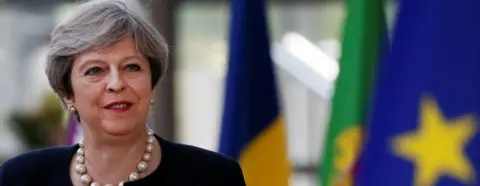UK in Brexit pledge on citizens’ rights at EU summit
EU leaders are holding summit talks in Brussels, where they will hear the UK's plans for protecting EU citizens' rights after Brexit.
UK Prime Minister Theresa May will brief them on Thursday night. Negotiations on the UK's exit terms began on Monday.
"I will be setting out how the UK proposes to protect the rights of EU citizens in the UK," Mrs May said.
Counter-terrorism is also a key issue, after an attack in Brussels on Tuesday.
A suspected Islamist bomber was shot dead at the city's central railway station.
Several EU states have been attacked in recent weeks, including the UK, France and Sweden, and the UK prime minister said that an attack against any member state was an attack on all.
The 28 leaders agreed to put legal pressure on internet giants like Google, Twitter and Facebook to remove jihadist content faster and more proactively.
European Council President Donald Tusk said the bloc was calling on social media companies to do whatever was necessary to prevent the spread of terrorist material and was prepared to pass new legislation. "This means developing new tools to detect and remove material automatically," he said.
The EU wants the industry to help tackle the problem of attackers slipping under the radar by using apps with end-to-end encryption.
Cast-iron guarantees
 Reuters
ReutersBrexit discussions will be limited, because the EU is conducting negotiations separately with the UK. But it overshadows the summit.
The EU wants cast-iron guarantees for the estimated 3.2 million EU citizens living in the UK, and 1.2 million Britons living in the EU 27. Chancellor Angela Merkel told reporters she wanted "the widest possible security guarantees for EU citizens" from the Brexit deal.
There is nervousness not only because of the tight timescale for reaching a Brexit deal, but also because the UK election left Mrs May seriously weakened, heading a minority government.
Many EU citizens in the UK, and Britons living abroad, are worried about their status once Brexit happens. The UK's exit deadline is 30 March 2019. Some even fear deportation if their EU rights are not guaranteed.
As the summit got under way, Mr Tusk emphasised that the door to the UK staying in the EU was still open. Quoting John Lennon's Imagine, he said: "You may say I'm a dreamer, but I'm not the only one."
Dutch Prime Minister Mark Rutte said that as an Anglophile, "I hate Brexit from every angle".
"It is crucially important we know what Britain wants from Brexit," he warned. The Netherlands is one of the UK's closest EU allies, with a similar stance on free trade.
Mrs May has vowed to take the UK out of both the EU single market and the customs union. But there are many voices - including in her Conservative Party - pressing for a softer Brexit.
"I hope we'll come to some form of continued [UK] membership or relationship with the internal market," Mr Rutte said. "I absolutely believe the UK will be hit in the economy and the pound very hard."
The other thorny Brexit issues to be tackled early on are the UK's divorce bill and the Northern Ireland border.
The UK is anxious to start negotiating a new trade deal soon, but the EU has already won the argument that its Brexit priorities must be addressed first.
National rivalry is always a feature of EU summits. But Brexit has given it added piquancy this time, because the EU must decide on relocating the London-based European Medicines Agency (EMA) and European Banking Authority (EBA).
A "beauty contest" is under way, as about 20 countries are vying to host one or other of the agencies, or both.
This summit should see an agreement on the relocation procedure, so that a vote can be taken in October.
Remarkably, Belgium is a candidate for hosting the EMA, despite already being the EU's headquarters and reaping the rewards from that.
The agencies employ hundreds of people and there are many related jobs in their various committees.
